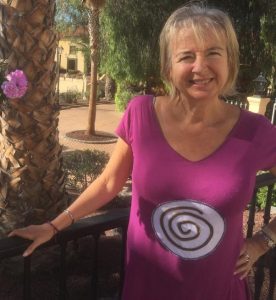Karen Skehel facilitates Mind and Body Mindfulness sessions for RB Mind, alongside other work in the field of compassion for wellbeing.

I operate under the umbrella of compassion at work. If you’re in an environment where there is compassion, it is easier to implement self-compassion practices. And as we immerse ourselves in the practices of compassion, we start to practice it automatically.
There are so many different benefits of compassion for our wellbeing, and anxiety and depression are reduced or eliminated. There are benefits for resilience, relationships and belonging. As our resilience grows, and our relationships are enhanced, and our feeling of belonging grows and really affects every area of our wellbeing.
Often people just care about what other people think. But what we think of ourselves is really important. What other people think won’t necessarily help us if we don’t feel good about ourselves.
Recently I’ve become interested in the question that we ask ourselves and each other all the time, ‘how are you?’ Often when we ask that question, it doesn’t actually mean ‘how are you?’ Also, when we answer, we may not be answering in a way that’s compassionate to ourselves, because we may be ignoring the parts of ourselves that are not feeling so okay.
I actually think there’s something about society’s pressures. We live in a culture where we’re not really encouraged to feel. Ultimately, as a society, my belief is that we need to change for us to normalise the emotional experience. There’s a lot more education to be done. A lot more healing to be done.
I just saw a new client this morning who has a lot of skills, and was telling me about the areas where he wasn’t strong. As if that was something that he should be concerned about. But ultimately, we all have areas where we’re strong, and we all have areas that we’re not strong. So, if we’re not strong, we need to find other ways of achieving what we need to achieve. There are lots of different therapeutic modalities. And as the starting point, my recommendation would be to start with self-compassion. If you have self-compassion practices as your bread and butter, the food and water of your therapeutic wellbeing practices, you will start to see change.
I would describe my own experiences of quite extreme mental health suffering, quite extreme depression. My nervous system was set on fight or flight all the time. That creates a lot of anxiety. Since my twenties, I was looking for what would help me to feel peaceful. I always talk about this analogy, if you have a little bit of a dripping tap in your kitchen, you can ignore it. But when a pipe bursts and floods over your kitchen, you don’t ignore it, it’s your priority.
I was looking for various different modalities that would help and actually found nothing did until I immersed myself in self-compassion. I started offering my compassionate practices. Then COVID came and I took all my work online.
We start with a check-in, so that’s getting used to feeling into the physical sensations. We start to tune into the body and notice what’s going on in the body. As a kind of in response to the question, ‘how are you?’ It’s ‘I’m noticing a tightening in the back of my neck.’ And ‘I’m noticing as a pain in my ankle.’ So, it’s just noticing what’s going on in the body. And that is called the power of presence. It’s also saying to each of those parts, ‘I’m here with you, I’m present with you, I’m acknowledging you, you’re not alone.’ So it’s a very simple, very powerful act of presence.
The question is, which part of myself would first like to receive my conscious focus and attention? And we take them in there, and then they can describe what’s going on. I like to support that part of the practice with the voice of compassion to open up their own voice of compassion.
Yes. I think we want quick transformation, but I think change that sticks is slower and it’s more sustainable. If someone’s been using their critical voice thoroughly for decades, then they need to replace the critical voice with the voice and practices of compassion, then they get the benefits.
100%. I do say people can come to my sessions without charge. Or they can make a donation. And I’m really happy either way, because it’s beneficial for me as well to be offering these sessions, because I have the structure and discipline to do them.
It’s for beginners too. If you are practicing mindfulness already, that’s great. If you find mindfulness really difficult, that’s great too, because this is an easier version of it. It’s worth coming a few times before people decide whether it’s for them, because sometimes your first experience might be a bit neutral. It’s a new experience for people. It’s not really like other things, as it’s so different. People can come as often as it frequently or as infrequently as they like.
Yes. And they can also come under a different name. There’s somebody who joins my sessions called iPhone. Maybe they’re a celebrity. If they don’t want to say who they are that’s fine, isn’t it? They have total choice!
Karen’s Mind and Body Mindfulness sessions take place on Mondays 10-11am on Zoom. Sessions are free of charge.
Book your place via Eventbrite here.